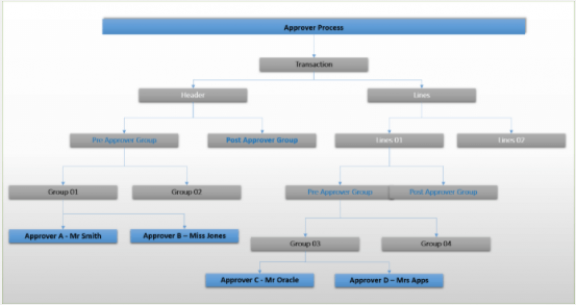Oracle EBusiness Suite (EBS) Approvals R11, R12 and Oracle Cloud (Fusion) – Approval Management
To Approve or Not To Approve, That’s the Question? What’s the Solution, Workflow, AME or AMX…?
Over the last 20 years I have seen many Clients struggle with the implementation of Approval Management in the Oracle EBusiness Suite. Whether this is using any of the following:
- Oracle Standard Functionality Approval Process.
- Modified/Extended Workflow Processes.
- Modified/Extended Workflow Notification (JRAD/OA Framework Style Notification).
- Modified/Extended BPEL Processes.
- AME Implementations.
- AMX the new Cloud Solutions (ERP & HCM).
- HRMS Self Service Approvals or Financials PO Approvals.
There are many ways that Oracle can be leveraged to work for the Client with regard to Transactional Approval Management. From simple approval routing via the supervisory hierarchy chain, all the way through to complex approval routing via positional hierarchy chains with multiple approval groups. And, these groups in support of either parallel approvals or taking the first approver with or without 100’s of cost centre rules or groups… Predominantly, the solution must fit with your business needs, however we can help by bringing our extensive experience of ALL of the tools mentioned to the party.

There are many routes approval transactions can take (figure 1). It is important to make sure that you have the right routes planned as we all know how disastrous it can be without.
We have seen clients try and limit the AME Approval Rules maintenance by implementing Dynamic Approval Groups that make use of standard approval chains, approval groups and flexfield/lookups. Hence opting for a more technical approach. But if you are moving to the Cloud and cannot make use of Dynamic Approval Groups calling PL/SQL Routines or Java, how can you transition to the Cloud?
Depending on the type of implementation, debugging approvals and logging can encompass many technical and module areas. This means that monitoring and maintaining can become a costly and time consuming process.
Approval Management can be a very complex process if not approached correctly, but can also save time, money and resources on a massive scale if done right.
We can recommend a few handy pointers to ensure that the implementation of your Approval Management processes are realistic, manageable and a success. These tips are offered for both an operational user level and technical service level, as you will have to work with and maintain these hierarchies after go-live.
Think about the following before jumping into hierarchy design and/or configuration, and if you need any advice give us a call:
- Analyse both your Current and Future Needs.
- Always look at all your business cases and really think outside the box. What happens when there’s that ‘One Off’ business case; is it always just the one? Always think about that ‘One Time’ exception when the rules don’t apply and/or when that notification is sent to that person that’s on holiday.
- Keep your Approvals Rules as simple as possible to ease maintenance moving forward. Think about Oracle Apps Rules, Flexfields and Lookups Maintenance and Technical Maintenance.
- Look to exploit Oracle’s Standard Functionality (Flexfields Key/Desc, FND Lookups, User Hierarchies, AP Approval Groups etc).
- Think about the technology employed in extending the Standard Oracle Applications and resources at hand (Pl/SQL, Workflow, BPEL, JRAD, OA Framework, Apps Module HRMS/AP/AR, AME/AMX and many more).
- Include Logging at every step of the way in your implementation for maintenance if possible and with future queries on ‘Why did that purchase order approval get sent to Mr Smith in the IT Section and not Jenny in Finance three days ago?’ If you don’t document these processes now you’ll never completely remember why they were configured in that particular way. I promise there will have been a good reason but if you can’t remember it how can you evaluate if that reason is still applicable today?
- Watch out for patching and keep your patching under control! Many implemented changes/extensions/setups especially in Oracle Workflow can be blown away by patching depending on the way the Workflow has been extended or changed.
Of course implementing any Approval Management carries risk. There could be new business cases that weren’t thought of that could introduce issues into the system or notifications going into black holes with no log of how they got there. However, a fully documented solution, including logging and thorough testing strategies can help mitigate any risk. At Claremont we pride ourselves on making sure the ‘Nuts and Bolts’ of your system stay shiny and new no matter how old or new your implementations may be.

Paul Whitehouse
Managed Services Consultant
Paul is an Oracle Technical/Functional Developer with over 20 years’ experience in Oracle EBusiness Suite Apps HRMS, CRM, Financials and Oracle Bespoke Apps, working in both the Consulting and Managed services areas.
Paul is responsible for supporting numerous client applications and implementing many Oracle Apps extensions across the Claremont‘s customer base.
